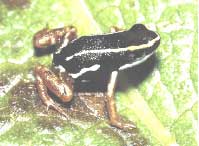
animal and plant species are discovered every year, only to languish in storage?unnamed, undescribed, and thus without entry into the larger scientific world.
So here is your chance. Ante up a bit of cash and BIOPAT (Patrons for Biodiversity) will help you attach your name, or someone else?s, to a species still waiting in the wings for recognition. The idea belongs to Gerhard Haszprunar, a systematic zoology professor at the University of Munich, who believed that individuals or groups would pay for the privilege of naming a species and in turn help fund taxonomy research and conservation.
Perhaps your sister just had a baby, and you wish to christen a new species in her honor. The BIOPAT Web site uses the example of someone named Margret. You choose an orchid, genus Maxillaria. It will be officially known as Maxillaria margretae, or the “Margret Orchid.”
The entire process begins when a species is selected, often from the catalogue found on BIOPAT?s Web site (www.biopat.de). It is pulled from storage and undergoes a rigorous description process, complete with at least two submissions to a scientific periodical.
Upon completion of these requirements, which often takes several months, the selected name is certified and enters into scientific usage. A donation is also required with the minimum being about $3,300. Lizards and butterflies are the most expensive, insects and arthropods are relative bargains, but frogs and orchids remain the most popular species. Despite claims that this process could sacrifice scientific integrity, no such problems have arisen.
BIOPAT has raised nearly half a million dollars in four years, even though the organization has occasionally turned down requests that it felt were unsuitable. Donations go to the institute or researcher that has identified the species and also to research projects in the country of the species? origin.
BIOPAT is a nonprofit organization, so all donations are tax deductible. More than 100 species have been sponsored and named. Even corporations have donated, finding it noteworthy to have their name attached to a species. Of course, the hope is that donors will now have a vested interest in regional conservation?if only to guarantee the continuation of a species bearing their name.
Science magazine


